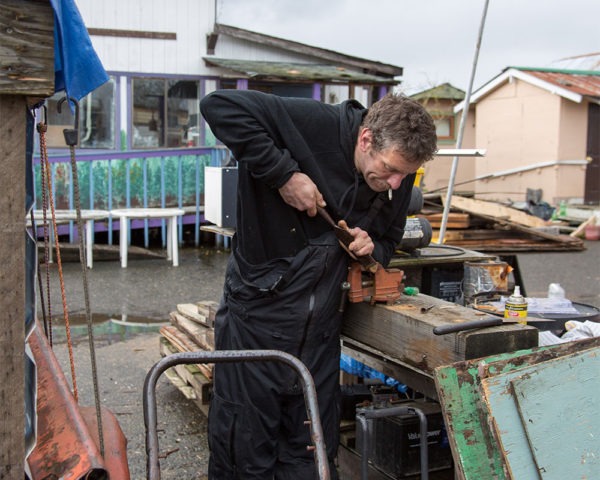Brian is a jack-of-all-trades maker and repairer at Dignity Village, a tiny house community for houseless people near the Portland airport. When we visit, he’s found a piece of ipe, a South American hardwood, known for its durability and its difficulty to work. He’s making guitar picks.
“I taught myself. Didn’t have nobody to learn from, you know, I’m always the one doing it myself. I’ve been in the construction trade since I was a teenager, done an awful lot of building, and awful lot of apartment maintenance. I did an awful lot of the repairs around here, and I finally got out after like three years of doing it straight. Fixing rooms and building ramps, and rebuilding. So I’ll go back and I’ll do it, but I just got burned out, couldn’t get even get myself motivated to get to it anymore.”
Brian walks us around the village, and can show us something he fixed or made at nearly every turn- a harpoon for breaking ice in rainwater barrels, a knife handle given to a friend, two mounted and carved stone memorial plaques, and lots of repairs and additions to the tiny homes themselves. Brian is most enthusiastic about making and repairing tools. One source of income in the village is selling firewood, so the residents go through a lot of axe handles. Brian rehandles them.
“I enjoy doing the handles. The first time I did it, it took me about an hour. Now I do it in ten minutes. And they’re lasting longer. The problem with me is the resources at hand. For what it is I’m trying to accomplish. Everything I’m working with is found here. We got it pretty good here, between the scrap yard and all the stuff that’s over there. We have a pretty good lumberyard here.”
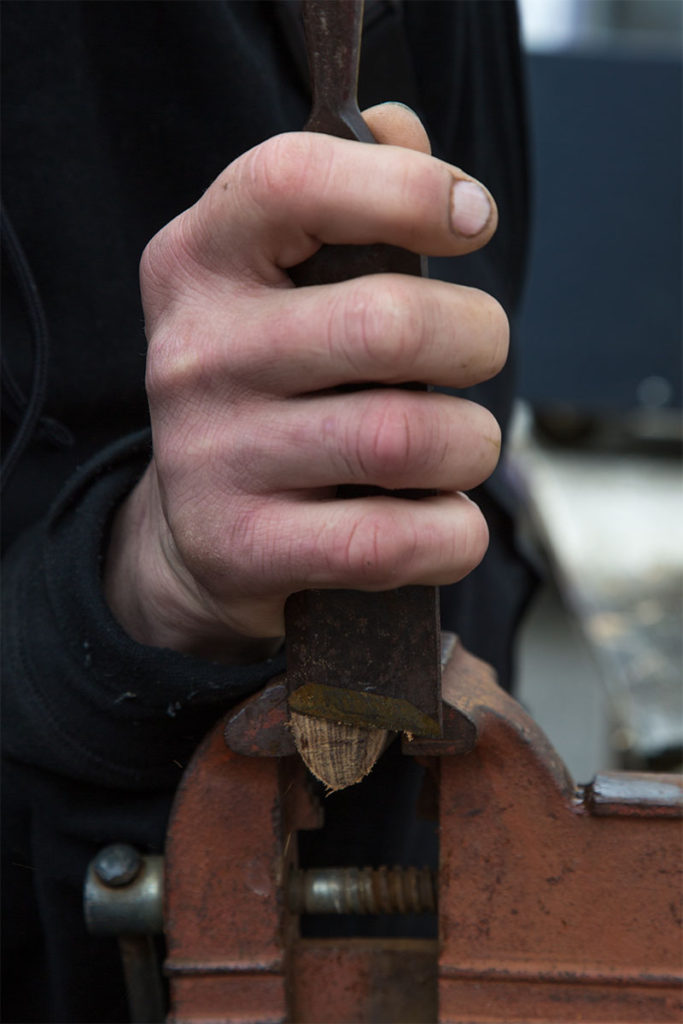
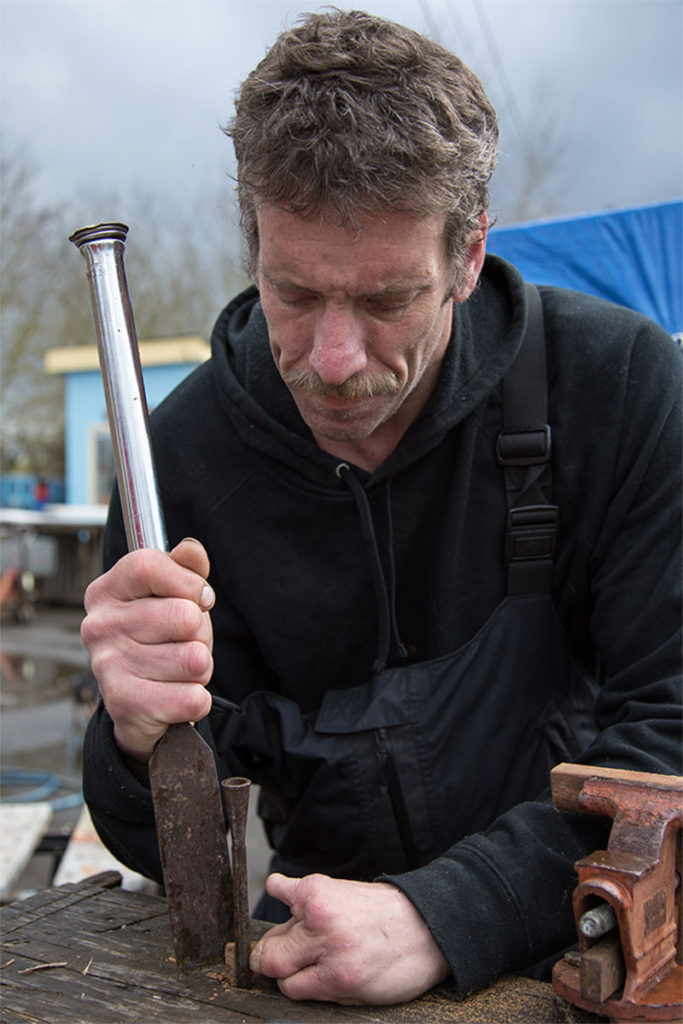
Making a guitar pick from a found piece of ipe
Dignity Village’s lumberyard is not what most of us would think of as a lumberyard– It looks more like a pile of scrap wood sitting out in the rain. But the scarcity of resources seems to fuel Brian’s creativity. The chisel he is working with has what looks like a chromed steel handle, its butt end mushrooming from hammer impacts. I ask him about it and he tells me it’s made out of a bike seatpost, split and hammered into the chisel blade. It’s that kind of resourcefulness that’s made him such an asset around Dignity Village.
“I’m the only that really does this thing here- the …so I have this idea. I find myself in a wide variety of things I get into. Generally I’m the only one out of all my friends to do something different. It’s not always making or fixing things, like when I got the bass guitar, I just wanted to learn something new and different.”
Brian’s ideas and experiments are sometimes a source of income.
“A lot of the stuff I’ve made myself ends up getting sold. My original idea was ok, to have someone come into my shop or my area and, what do you like, and show them different things and go from there. Well, it don’t always happen like that. My first hammer I did was a laminate– oak and walnut. I basically fell in love with the thing– you’re my new favorite tool, you know– I hand rubbed it for like six hours, and that’s when I first met Robbie. So is that for sale? well….yes?”
“My idea was to maybe sell the guitar picks too. But got to make them first. Or they’ll be like gifts. For my friends that do have guitars and such. That’s how generally a lot of my stuff starts out, I’ll have an idea on a design or something, and I’ll give it to a friend. I had a maple burl, and a nice size, and I started thinly slicing it and making clock faces out of it. That one made me some money. I made twelve or thirteen of them. Very beautiful wood. First time working with a burl, and you can sand it any direction– there’s no grain. It doesn’t matter. I generally sell my work right here in the village.”
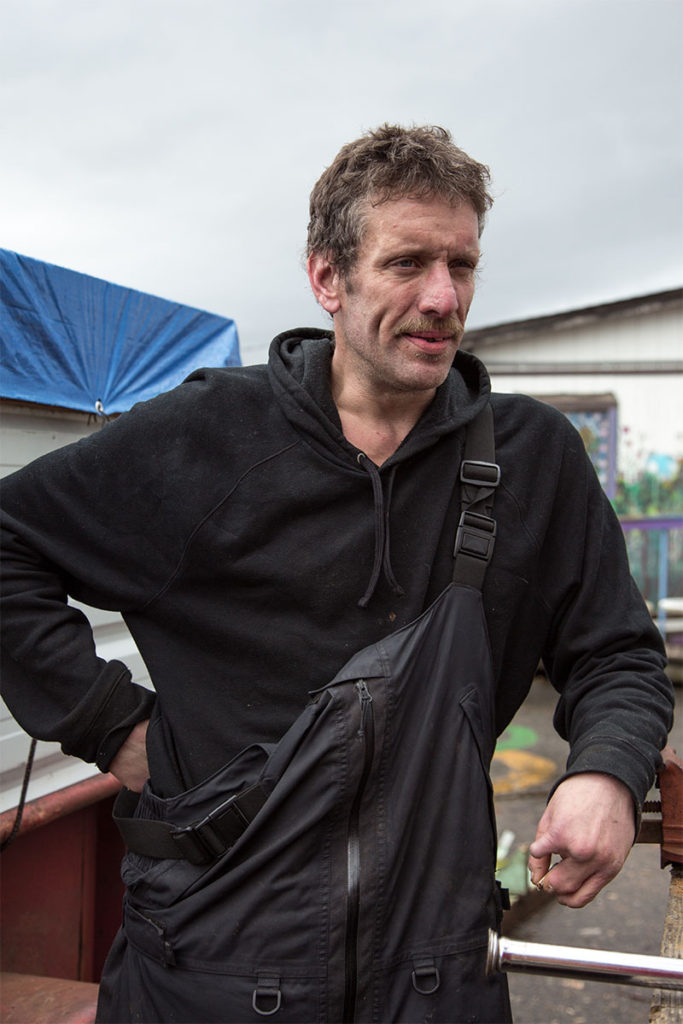

Brian’s scrap yard at Dignity Village
Brian works with quiet intensity and seemingly endless patience. I ask him what he likes about doing repair work:
“Well, I’m a drug addict, for one. I’m a barely functioning drug addict. I do meth. But it’s like in my childhood– kids can be cruel and horrible– I was born this way [Brian shows me his left hand; his first two fingers are stumps] so yeah, I see a broken tool, I see, well that can be fixed. That’s what I do, make it useful again, make it wanted. Sometimes a skill not easily done. Got to have patience, that’s for damn sure.”
This methodical, studied approach to repair work is a source of pride for Brian and makes him more successful than others. I ask him if he knows how to work on cars.
“I know how. I will do it. We had a lady here, by the name of Mary R, and her truck stopped running. And I watched all the single men in the village here go ‘I’ll help’ and ‘I’ll help’, ‘buy that part’ and ‘buy this part’, and the pile of guys got down to nobody and the truck still wasn’t working. So I asked her, do you have the book on it, like a Thomas guide or a Haynes. I said go get that book and I’ll figure out what the problem is, and I was able to. It was an electrical control module up in the distributer that was shot, and so I was like ‘take this and make them test it, and if it works, don’t buy nothing, it means I did something wrong’ but I was right.”
“I’m patient. And if I don’t know, I will try to get some information on it. Not always can you, but if I can get the book on it, I can do it then. Woodworking is something I’ve picked up over the years, Trial and error, an awful lot of trial and error. But you can’t really do trial and error on someone’s truck though, they tend to get a little mad. I’ve seen some funny things done.”
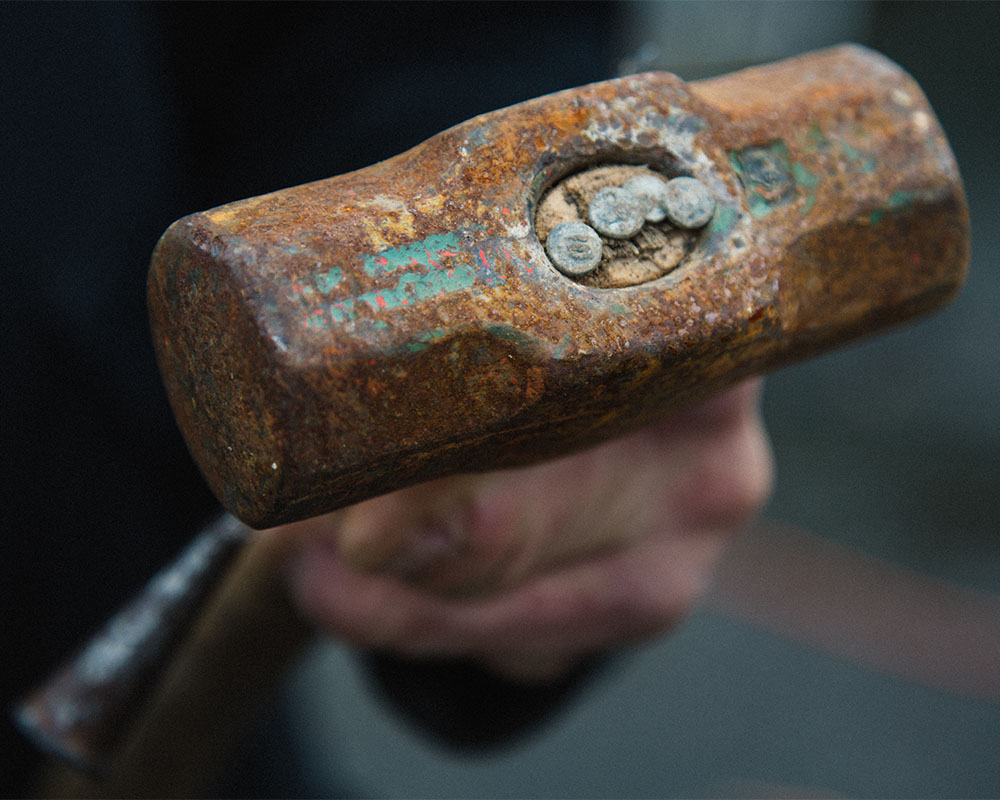
Using nails in place of wooden wedges to secure a mallet head
